這篇文章旨在教大家如何配置arch中文和中文輸入法和對時間的調整 主要解決三點問題 1.顯示中文 2.使用中文輸入法 3.顯示正確的時間 目錄這篇文章旨在教大家如何配置arch中文和中文輸入法和對時間的調整第一步,就是把arch切換成中文第二步,就是如何使用中文輸入法時間問題解決 我arch版本是a ...
MCP2515是SPI轉CAN 模塊
建議在完成且掌握泰山派小手機項目的全過程後進行此操作,這樣難度會低一些
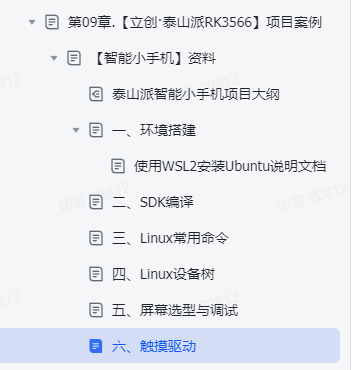
目標平臺: 泰山派
連接:
rk3566(泰山派)的spi3各管腳連接MCP2515的SPI介面,另外MCP2515還需要一個中斷引腳,用到的全部管腳如下:

其中GPIO3_A6為中斷引腳
``
移植過程:
1.配置kernel
cd到SDK/kernel 目錄下,執行
make ARCH=arm64 menuconfig,打開相關的配置項,看下圖:↓
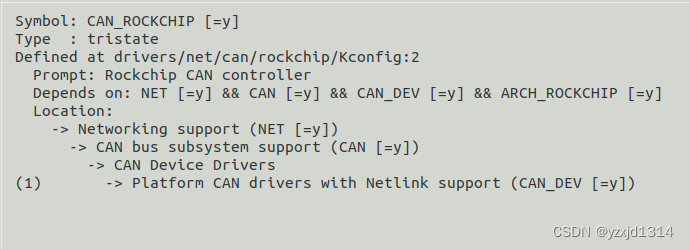
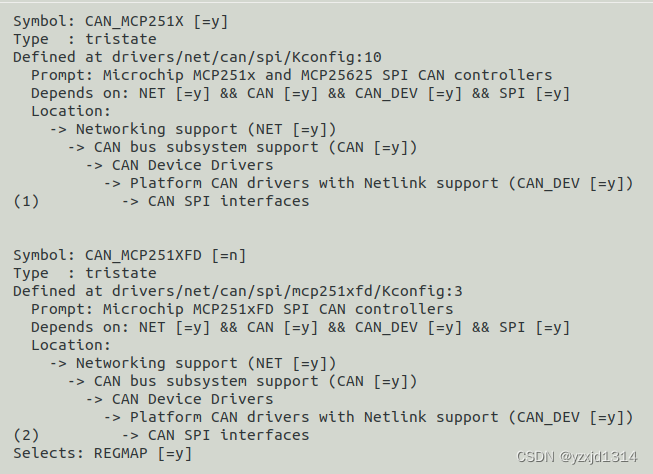
即打開CAN_ROCKCHIP和CAN_MCP251X項
save,生成.config後,使用make ARCH=arm64 savedefconfig命令 將在sdk/kernel目錄下生成一個defconfig文件.
實際上,編譯器訪問的config文件在 sdk/kernel/arch/arm64/configs/ 下,被命名為rockchip_linux_defconfig,為了防止翻車,可以將源文件命名為 rockchip_linux_defconfig.bak,接下來在 sdk/kernel 下使用命令:
mv defconfig arch/arm64/configs/rockchip_linux_defconfig
2.改驅動文件
mcp2515的驅動文件名為 cmp251x.c,在 SDK/kernel/drivers/net/can/spi下,下麵是完整的 mcp251x.c文件的內容,請替換掉原有內容
點擊查看代碼
// SPDX-License-Identifier: GPL-2.0-only
/* CAN bus driver for Microchip 251x/25625 CAN Controller with SPI Interface
*
* MCP2510 support and bug fixes by Christian Pellegrin
* <[email protected]>
*
* Copyright 2009 Christian Pellegrin EVOL S.r.l.
*
* Copyright 2007 Raymarine UK, Ltd. All Rights Reserved.
* Written under contract by:
* Chris Elston, Katalix Systems, Ltd.
*
* Based on Microchip MCP251x CAN controller driver written by
* David Vrabel, Copyright 2006 Arcom Control Systems Ltd.
*
* Based on CAN bus driver for the CCAN controller written by
* - Sascha Hauer, Marc Kleine-Budde, Pengutronix
* - Simon Kallweit, intefo AG
* Copyright 2007
*/
#include <linux/bitfield.h>
#include <linux/can/core.h>
#include <linux/can/dev.h>
#include <linux/can/led.h>
#include <linux/clk.h>
#include <linux/completion.h>
#include <linux/delay.h>
#include <linux/device.h>
#include <linux/freezer.h>
#include <linux/gpio.h>
#include <linux/gpio/driver.h>
#include <linux/interrupt.h>
#include <linux/io.h>
#include <linux/iopoll.h>
#include <linux/kernel.h>
#include <linux/module.h>
#include <linux/netdevice.h>
#include <linux/platform_device.h>
#include <linux/property.h>
#include <linux/regulator/consumer.h>
#include <linux/slab.h>
#include <linux/spi/spi.h>
#include <linux/uaccess.h>
/* SPI interface instruction set */
#define INSTRUCTION_WRITE 0x02
#define INSTRUCTION_READ 0x03
#define INSTRUCTION_BIT_MODIFY 0x05
#define INSTRUCTION_LOAD_TXB(n) (0x40 + 2 * (n))
#define INSTRUCTION_READ_RXB(n) (((n) == 0) ? 0x90 : 0x94)
#define INSTRUCTION_RESET 0xC0
#define RTS_TXB0 0x01
#define RTS_TXB1 0x02
#define RTS_TXB2 0x04
#define INSTRUCTION_RTS(n) (0x80 | ((n) & 0x07))
/* MPC251x registers */
#define BFPCTRL 0x0c
# define BFPCTRL_B0BFM BIT(0)
# define BFPCTRL_B1BFM BIT(1)
# define BFPCTRL_BFM(n) (BFPCTRL_B0BFM << (n))
# define BFPCTRL_BFM_MASK GENMASK(1, 0)
# define BFPCTRL_B0BFE BIT(2)
# define BFPCTRL_B1BFE BIT(3)
# define BFPCTRL_BFE(n) (BFPCTRL_B0BFE << (n))
# define BFPCTRL_BFE_MASK GENMASK(3, 2)
# define BFPCTRL_B0BFS BIT(4)
# define BFPCTRL_B1BFS BIT(5)
# define BFPCTRL_BFS(n) (BFPCTRL_B0BFS << (n))
# define BFPCTRL_BFS_MASK GENMASK(5, 4)
#define TXRTSCTRL 0x0d
# define TXRTSCTRL_B0RTSM BIT(0)
# define TXRTSCTRL_B1RTSM BIT(1)
# define TXRTSCTRL_B2RTSM BIT(2)
# define TXRTSCTRL_RTSM(n) (TXRTSCTRL_B0RTSM << (n))
# define TXRTSCTRL_RTSM_MASK GENMASK(2, 0)
# define TXRTSCTRL_B0RTS BIT(3)
# define TXRTSCTRL_B1RTS BIT(4)
# define TXRTSCTRL_B2RTS BIT(5)
# define TXRTSCTRL_RTS(n) (TXRTSCTRL_B0RTS << (n))
# define TXRTSCTRL_RTS_MASK GENMASK(5, 3)
#define CANSTAT 0x0e
#define CANCTRL 0x0f
# define CANCTRL_REQOP_MASK 0xe0
# define CANCTRL_REQOP_CONF 0x80
# define CANCTRL_REQOP_LISTEN_ONLY 0x60
# define CANCTRL_REQOP_LOOPBACK 0x40
# define CANCTRL_REQOP_SLEEP 0x20
# define CANCTRL_REQOP_NORMAL 0x00
# define CANCTRL_OSM 0x08
# define CANCTRL_ABAT 0x10
#define TEC 0x1c
#define REC 0x1d
#define CNF1 0x2a
# define CNF1_SJW_SHIFT 6
#define CNF2 0x29
# define CNF2_BTLMODE 0x80
# define CNF2_SAM 0x40
# define CNF2_PS1_SHIFT 3
#define CNF3 0x28
# define CNF3_SOF 0x08
# define CNF3_WAKFIL 0x04
# define CNF3_PHSEG2_MASK 0x07
#define CANINTE 0x2b
# define CANINTE_MERRE 0x80
# define CANINTE_WAKIE 0x40
# define CANINTE_ERRIE 0x20
# define CANINTE_TX2IE 0x10
# define CANINTE_TX1IE 0x08
# define CANINTE_TX0IE 0x04
# define CANINTE_RX1IE 0x02
# define CANINTE_RX0IE 0x01
#define CANINTF 0x2c
# define CANINTF_MERRF 0x80
# define CANINTF_WAKIF 0x40
# define CANINTF_ERRIF 0x20
# define CANINTF_TX2IF 0x10
# define CANINTF_TX1IF 0x08
# define CANINTF_TX0IF 0x04
# define CANINTF_RX1IF 0x02
# define CANINTF_RX0IF 0x01
# define CANINTF_RX (CANINTF_RX0IF | CANINTF_RX1IF)
# define CANINTF_TX (CANINTF_TX2IF | CANINTF_TX1IF | CANINTF_TX0IF)
# define CANINTF_ERR (CANINTF_ERRIF)
#define EFLG 0x2d
# define EFLG_EWARN 0x01
# define EFLG_RXWAR 0x02
# define EFLG_TXWAR 0x04
# define EFLG_RXEP 0x08
# define EFLG_TXEP 0x10
# define EFLG_TXBO 0x20
# define EFLG_RX0OVR 0x40
# define EFLG_RX1OVR 0x80
#define TXBCTRL(n) (((n) * 0x10) + 0x30 + TXBCTRL_OFF)
# define TXBCTRL_ABTF 0x40
# define TXBCTRL_MLOA 0x20
# define TXBCTRL_TXERR 0x10
# define TXBCTRL_TXREQ 0x08
#define TXBSIDH(n) (((n) * 0x10) + 0x30 + TXBSIDH_OFF)
# define SIDH_SHIFT 3
#define TXBSIDL(n) (((n) * 0x10) + 0x30 + TXBSIDL_OFF)
# define SIDL_SID_MASK 7
# define SIDL_SID_SHIFT 5
# define SIDL_EXIDE_SHIFT 3
# define SIDL_EID_SHIFT 16
# define SIDL_EID_MASK 3
#define TXBEID8(n) (((n) * 0x10) + 0x30 + TXBEID8_OFF)
#define TXBEID0(n) (((n) * 0x10) + 0x30 + TXBEID0_OFF)
#define TXBDLC(n) (((n) * 0x10) + 0x30 + TXBDLC_OFF)
# define DLC_RTR_SHIFT 6
#define TXBCTRL_OFF 0
#define TXBSIDH_OFF 1
#define TXBSIDL_OFF 2
#define TXBEID8_OFF 3
#define TXBEID0_OFF 4
#define TXBDLC_OFF 5
#define TXBDAT_OFF 6
#define RXBCTRL(n) (((n) * 0x10) + 0x60 + RXBCTRL_OFF)
# define RXBCTRL_BUKT 0x04
# define RXBCTRL_RXM0 0x20
# define RXBCTRL_RXM1 0x40
#define RXBSIDH(n) (((n) * 0x10) + 0x60 + RXBSIDH_OFF)
# define RXBSIDH_SHIFT 3
#define RXBSIDL(n) (((n) * 0x10) + 0x60 + RXBSIDL_OFF)
# define RXBSIDL_IDE 0x08
# define RXBSIDL_SRR 0x10
# define RXBSIDL_EID 3
# define RXBSIDL_SHIFT 5
#define RXBEID8(n) (((n) * 0x10) + 0x60 + RXBEID8_OFF)
#define RXBEID0(n) (((n) * 0x10) + 0x60 + RXBEID0_OFF)
#define RXBDLC(n) (((n) * 0x10) + 0x60 + RXBDLC_OFF)
# define RXBDLC_LEN_MASK 0x0f
# define RXBDLC_RTR 0x40
#define RXBCTRL_OFF 0
#define RXBSIDH_OFF 1
#define RXBSIDL_OFF 2
#define RXBEID8_OFF 3
#define RXBEID0_OFF 4
#define RXBDLC_OFF 5
#define RXBDAT_OFF 6
#define RXFSID(n) ((n < 3) ? 0 : 4)
#define RXFSIDH(n) ((n) * 4 + RXFSID(n))
#define RXFSIDL(n) ((n) * 4 + 1 + RXFSID(n))
#define RXFEID8(n) ((n) * 4 + 2 + RXFSID(n))
#define RXFEID0(n) ((n) * 4 + 3 + RXFSID(n))
#define RXMSIDH(n) ((n) * 4 + 0x20)
#define RXMSIDL(n) ((n) * 4 + 0x21)
#define RXMEID8(n) ((n) * 4 + 0x22)
#define RXMEID0(n) ((n) * 4 + 0x23)
#define GET_BYTE(val, byte) \
(((val) >> ((byte) * 8)) & 0xff)
#define SET_BYTE(val, byte) \
(((val) & 0xff) << ((byte) * 8))
/* Buffer size required for the largest SPI transfer (i.e., reading a
* frame)
*/
#define CAN_FRAME_MAX_DATA_LEN 8
#define SPI_TRANSFER_BUF_LEN (6 + CAN_FRAME_MAX_DATA_LEN)
#define CAN_FRAME_MAX_BITS 128
#define TX_ECHO_SKB_MAX 1
#define MCP251X_OST_DELAY_MS (5)
#define DEVICE_NAME "mcp251x"
static const struct can_bittiming_const mcp251x_bittiming_const = {
.name = DEVICE_NAME,
.tseg1_min = 3,
.tseg1_max = 16,
.tseg2_min = 2,
.tseg2_max = 8,
.sjw_max = 4,
.brp_min = 1,
.brp_max = 64,
.brp_inc = 1,
};
enum mcp251x_model {
CAN_MCP251X_MCP2510 = 0x2510,
CAN_MCP251X_MCP2515 = 0x2515,
CAN_MCP251X_MCP25625 = 0x25625,
};
struct mcp251x_priv {
struct can_priv can;
struct net_device *net;
struct spi_device *spi;
enum mcp251x_model model;
struct mutex mcp_lock; /* SPI device lock */
u8 *spi_tx_buf;
u8 *spi_rx_buf;
struct sk_buff *tx_skb;
int tx_len;
struct workqueue_struct *wq;
struct work_struct tx_work;
struct work_struct restart_work;
int force_quit;
int after_suspend;
#define AFTER_SUSPEND_UP 1
#define AFTER_SUSPEND_DOWN 2
#define AFTER_SUSPEND_POWER 4
#define AFTER_SUSPEND_RESTART 8
int restart_tx;
struct regulator *power;
struct regulator *transceiver;
struct clk *clk;
#ifdef CONFIG_GPIOLIB
struct gpio_chip gpio;
u8 reg_bfpctrl;
#endif
};
#define MCP251X_IS(_model) \
static inline int mcp251x_is_##_model(struct spi_device *spi) \
{ \
struct mcp251x_priv *priv = spi_get_drvdata(spi); \
return priv->model == CAN_MCP251X_MCP##_model; \
}
MCP251X_IS(2510);
static void mcp251x_clean(struct net_device *net)
{
struct mcp251x_priv *priv = netdev_priv(net);
if (priv->tx_skb || priv->tx_len)
net->stats.tx_errors++;
dev_kfree_skb(priv->tx_skb);
if (priv->tx_len)
can_free_echo_skb(priv->net, 0);
priv->tx_skb = NULL;
priv->tx_len = 0;
}
/* Note about handling of error return of mcp251x_spi_trans: accessing
* registers via SPI is not really different conceptually than using
* normal I/O assembler instructions, although it's much more
* complicated from a practical POV. So it's not advisable to always
* check the return value of this function. Imagine that every
* read{b,l}, write{b,l} and friends would be bracketed in "if ( < 0)
* error();", it would be a great mess (well there are some situation
* when exception handling C++ like could be useful after all). So we
* just check that transfers are OK at the beginning of our
* conversation with the chip and to avoid doing really nasty things
* (like injecting bogus packets in the network stack).
*/
static int mcp251x_spi_trans(struct spi_device *spi, int len)
{
struct mcp251x_priv *priv = spi_get_drvdata(spi);
struct spi_transfer t = {
.tx_buf = priv->spi_tx_buf,
.rx_buf = priv->spi_rx_buf,
.len = len,
.cs_change = 0,
};
struct spi_message m;
int ret;
spi_message_init(&m);
spi_message_add_tail(&t, &m);
ret = spi_sync(spi, &m);
if (ret)
dev_err(&spi->dev, "spi transfer failed: ret = %d\n", ret);
return ret;
}
static int mcp251x_spi_write(struct spi_device *spi, int len)
{
struct mcp251x_priv *priv = spi_get_drvdata(spi);
int ret;
ret = spi_write(spi, priv->spi_tx_buf, len);
if (ret)
dev_err(&spi->dev, "spi write failed: ret = %d\n", ret);
return ret;
}
static u8 mcp251x_read_reg(struct spi_device *spi, u8 reg)
{
struct mcp251x_priv *priv = spi_get_drvdata(spi);
u8 val = 0;
priv->spi_tx_buf[0] = INSTRUCTION_READ;
priv->spi_tx_buf[1] = reg;
if (spi->controller->flags & SPI_CONTROLLER_HALF_DUPLEX) {
spi_write_then_read(spi, priv->spi_tx_buf, 2, &val, 1);
} else {
mcp251x_spi_trans(spi, 3);
val = priv->spi_rx_buf[2];
}
return val;
}
static void mcp251x_read_2regs(struct spi_device *spi, u8 reg, u8 *v1, u8 *v2)
{
struct mcp251x_priv *priv = spi_get_drvdata(spi);
priv->spi_tx_buf[0] = INSTRUCTION_READ;
priv->spi_tx_buf[1] = reg;
if (spi->controller->flags & SPI_CONTROLLER_HALF_DUPLEX) {
u8 val[2] = { 0 };
spi_write_then_read(spi, priv->spi_tx_buf, 2, val, 2);
*v1 = val[0];
*v2 = val[1];
} else {
mcp251x_spi_trans(spi, 4);
*v1 = priv->spi_rx_buf[2];
*v2 = priv->spi_rx_buf[3];
}
}
static void mcp251x_write_reg(struct spi_device *spi, u8 reg, u8 val)
{
struct mcp251x_priv *priv = spi_get_drvdata(spi);
priv->spi_tx_buf[0] = INSTRUCTION_WRITE;
priv->spi_tx_buf[1] = reg;
priv->spi_tx_buf[2] = val;
mcp251x_spi_write(spi, 3);
}
static void mcp251x_write_2regs(struct spi_device *spi, u8 reg, u8 v1, u8 v2)
{
struct mcp251x_priv *priv = spi_get_drvdata(spi);
priv->spi_tx_buf[0] = INSTRUCTION_WRITE;
priv->spi_tx_buf[1] = reg;
priv->spi_tx_buf[2] = v1;
priv->spi_tx_buf[3] = v2;
mcp251x_spi_write(spi, 4);
}
static void mcp251x_write_bits(struct spi_device *spi, u8 reg,
u8 mask, u8 val)
{
struct mcp251x_priv *priv = spi_get_drvdata(spi);
priv->spi_tx_buf[0] = INSTRUCTION_BIT_MODIFY;
priv->spi_tx_buf[1] = reg;
priv->spi_tx_buf[2] = mask;
priv->spi_tx_buf[3] = val;
mcp251x_spi_write(spi, 4);
}
static u8 mcp251x_read_stat(struct spi_device *spi)
{
return mcp251x_read_reg(spi, CANSTAT) & CANCTRL_REQOP_MASK;
}
#define mcp251x_read_stat_poll_timeout(addr, val, cond, delay_us, timeout_us) \
readx_poll_timeout(mcp251x_read_stat, addr, val, cond, \
delay_us, timeout_us)
#ifdef CONFIG_GPIOLIB
enum {
MCP251X_GPIO_TX0RTS = 0, /* inputs */
MCP251X_GPIO_TX1RTS,
MCP251X_GPIO_TX2RTS,
MCP251X_GPIO_RX0BF, /* outputs */
MCP251X_GPIO_RX1BF,
};
#define MCP251X_GPIO_INPUT_MASK \
GENMASK(MCP251X_GPIO_TX2RTS, MCP251X_GPIO_TX0RTS)
#define MCP251X_GPIO_OUTPUT_MASK \
GENMASK(MCP251X_GPIO_RX1BF, MCP251X_GPIO_RX0BF)
static const char * const mcp251x_gpio_names[] = {
[MCP251X_GPIO_TX0RTS] = "TX0RTS", /* inputs */
[MCP251X_GPIO_TX1RTS] = "TX1RTS",
[MCP251X_GPIO_TX2RTS] = "TX2RTS",
[MCP251X_GPIO_RX0BF] = "RX0BF", /* outputs */
[MCP251X_GPIO_RX1BF] = "RX1BF",
};
static inline bool mcp251x_gpio_is_input(unsigned int offset)
{
return offset <= MCP251X_GPIO_TX2RTS;
}
static int mcp251x_gpio_request(struct gpio_chip *chip,
unsigned int offset)
{
struct mcp251x_priv *priv = gpiochip_get_data(chip);
u8 val;
/* nothing to be done for inputs */
if (mcp251x_gpio_is_input(offset))
return 0;
val = BFPCTRL_BFE(offset - MCP251X_GPIO_RX0BF);
mutex_lock(&priv->mcp_lock);
mcp251x_write_bits(priv->spi, BFPCTRL, val, val);
mutex_unlock(&priv->mcp_lock);
priv->reg_bfpctrl |= val;
return 0;
}
static void mcp251x_gpio_free(struct gpio_chip *chip,
unsigned int offset)
{
struct mcp251x_priv *priv = gpiochip_get_data(chip);
u8 val;
/* nothing to be done for inputs */
if (mcp251x_gpio_is_input(offset))
return;
val = BFPCTRL_BFE(offset - MCP251X_GPIO_RX0BF);
mutex_lock(&priv->mcp_lock);
mcp251x_write_bits(priv->spi, BFPCTRL, val, 0);
mutex_unlock(&priv->mcp_lock);
priv->reg_bfpctrl &= ~val;
}
static int mcp251x_gpio_get_direction(struct gpio_chip *chip,
unsigned int offset)
{
if (mcp251x_gpio_is_input(offset))
return GPIOF_DIR_IN;
return GPIOF_DIR_OUT;
}
static int mcp251x_gpio_get(struct gpio_chip *chip, unsigned int offset)
{
struct mcp251x_priv *priv = gpiochip_get_data(chip);
u8 reg, mask, val;
if (mcp251x_gpio_is_input(offset)) {
reg = TXRTSCTRL;
mask = TXRTSCTRL_RTS(offset);
} else {
reg = BFPCTRL;
mask = BFPCTRL_BFS(offset - MCP251X_GPIO_RX0BF);
}
mutex_lock(&priv->mcp_lock);
val = mcp251x_read_reg(priv->spi, reg);
mutex_unlock(&priv->mcp_lock);
return !!(val & mask);
}
static int mcp251x_gpio_get_multiple(struct gpio_chip *chip,
unsigned long *maskp, unsigned long *bitsp)
{
struct mcp251x_priv *priv = gpiochip_get_data(chip);
unsigned long bits = 0;
u8 val;
mutex_lock(&priv->mcp_lock);
if (maskp[0] & MCP251X_GPIO_INPUT_MASK) {
val = mcp251x_read_reg(priv->spi, TXRTSCTRL);
val = FIELD_GET(TXRTSCTRL_RTS_MASK, val);
bits |= FIELD_PREP(MCP251X_GPIO_INPUT_MASK, val);
}
if (maskp[0] & MCP251X_GPIO_OUTPUT_MASK) {
val = mcp251x_read_reg(priv->spi, BFPCTRL);
val = FIELD_GET(BFPCTRL_BFS_MASK, val);
bits |= FIELD_PREP(MCP251X_GPIO_OUTPUT_MASK, val);
}
mutex_unlock(&priv->mcp_lock);
bitsp[0] = bits;
return 0;
}
static void mcp251x_gpio_set(struct gpio_chip *chip, unsigned int offset,
int value)
{
struct mcp251x_priv *priv = gpiochip_get_data(chip);
u8 mask, val;
mask = BFPCTRL_BFS(offset - MCP251X_GPIO_RX0BF);
val = value ? mask : 0;
mutex_lock(&priv->mcp_lock);
mcp251x_write_bits(priv->spi, BFPCTRL, mask, val);
mutex_unlock(&priv->mcp_lock);
priv->reg_bfpctrl &= ~mask;
priv->reg_bfpctrl |= val;
}
static void
mcp251x_gpio_set_multiple(struct gpio_chip *chip,
unsigned long *maskp, unsigned long *bitsp)
{
struct mcp251x_priv *priv = gpiochip_get_data(chip);
u8 mask, val;
mask = FIELD_GET(MCP251X_GPIO_OUTPUT_MASK, maskp[0]);
mask = FIELD_PREP(BFPCTRL_BFS_MASK, mask);
val = FIELD_GET(MCP251X_GPIO_OUTPUT_MASK, bitsp[0]);
val = FIELD_PREP(BFPCTRL_BFS_MASK, val);
if (!mask)
return;
mutex_lock(&priv->mcp_lock);
mcp251x_write_bits(priv->spi, BFPCTRL, mask, val);
mutex_unlock(&priv->mcp_lock);
priv->reg_bfpctrl &= ~mask;
priv->reg_bfpctrl |= val;
}
static void mcp251x_gpio_restore(struct spi_device *spi)
{
struct mcp251x_priv *priv = spi_get_drvdata(spi);
mcp251x_write_reg(spi, BFPCTRL, priv->reg_bfpctrl);
}
static int mcp251x_gpio_setup(struct mcp251x_priv *priv)
{
struct gpio_chip *gpio = &priv->gpio;
if (!device_property_present(&priv->spi->dev, "gpio-controller"))
return 0;
/* gpiochip handles TX[0..2]RTS and RX[0..1]BF */
gpio->label = priv->spi->modalias;
gpio->parent = &priv->spi->dev;
gpio->owner = THIS_MODULE;
gpio->request = mcp251x_gpio_request;
gpio->free = mcp251x_gpio_free;
gpio->get_direction = mcp251x_gpio_get_direction;
gpio->get = mcp251x_gpio_get;
gpio->get_multiple = mcp251x_gpio_get_multiple;
gpio->set = mcp251x_gpio_set;
gpio->set_multiple = mcp251x_gpio_set_multiple;
gpio->base = -1;
gpio->ngpio = ARRAY_SIZE(mcp251x_gpio_names);
gpio->names = mcp251x_gpio_names;
gpio->can_sleep = true;
#ifdef CONFIG_OF_GPIO
gpio->of_node = priv->spi->dev.of_node;
#endif
return devm_gpiochip_add_data(&priv->spi->dev, gpio, priv);
}
#else
static inline void mcp251x_gpio_restore(struct spi_device *spi)
{
}
static inline int mcp251x_gpio_setup(struct mcp251x_priv *priv)
{
return 0;
}
#endif
static void mcp251x_hw_tx_frame(struct spi_device *spi, u8 *buf,
int len, int tx_buf_idx)
{
struct mcp251x_priv *priv = spi_get_drvdata(spi);
if (mcp251x_is_2510(spi)) {
int i;
for (i = 1; i < TXBDAT_OFF + len; i++)
mcp251x_write_reg(spi, TXBCTRL(tx_buf_idx) + i,
buf[i]);
} else {
memcpy(priv->spi_tx_buf, buf, TXBDAT_OFF + len);
mcp251x_spi_write(spi, TXBDAT_OFF + len);
}
}
static void mcp251x_hw_tx(struct spi_device *spi, struct can_frame *frame,
int tx_buf_idx)
{
struct mcp251x_priv *priv = spi_get_drvdata(spi);
u32 sid, eid, exide, rtr;
u8 buf[SPI_TRANSFER_BUF_LEN];
exide = (frame->can_id & CAN_EFF_FLAG) ? 1 : 0; /* Extended ID Enable */
if (exide)
sid = (frame->can_id & CAN_EFF_MASK) >> 18;
else
sid = frame->can_id & CAN_SFF_MASK; /* Standard ID */
eid = frame->can_id & CAN_EFF_MASK; /* Extended ID */
rtr = (frame->can_id & CAN_RTR_FLAG) ? 1 : 0; /* Remote transmission */
buf[TXBCTRL_OFF] = INSTRUCTION_LOAD_TXB(tx_buf_idx);
buf[TXBSIDH_OFF] = sid >> SIDH_SHIFT;
buf[TXBSIDL_OFF] = ((sid & SIDL_SID_MASK) << SIDL_SID_SHIFT) |
(exide << SIDL_EXIDE_SHIFT) |
((eid >> SIDL_EID_SHIFT) & SIDL_EID_MASK);
buf[TXBEID8_OFF] = GET_BYTE(eid, 1);
buf[TXBEID0_OFF] = GET_BYTE(eid, 0);
buf[TXBDLC_OFF] = (rtr << DLC_RTR_SHIFT) | frame->can_dlc;
memcpy(buf + TXBDAT_OFF, frame->data, frame->can_dlc);
mcp251x_hw_tx_frame(spi, buf, frame->can_dlc, tx_buf_idx);
/* use INSTRUCTION_RTS, to avoid "repeated frame problem" */
priv->spi_tx_buf[0] = INSTRUCTION_RTS(1 << tx_buf_idx);
mcp251x_spi_write(priv->spi, 1);
}
static void mcp251x_hw_rx_frame(struct spi_device *spi, u8 *buf,
int buf_idx)
{
struct mcp251x_priv *priv = spi_get_drvdata(spi);
if (mcp251x_is_2510(spi)) {
int i, len;
for (i = 1; i < RXBDAT_OFF; i++)
buf[i] = mcp251x_read_reg(spi, RXBCTRL(buf_idx) + i);
len = get_can_dlc(buf[RXBDLC_OFF] & RXBDLC_LEN_MASK);
for (; i < (RXBDAT_OFF + len); i++)
buf[i] = mcp251x_read_reg(spi, RXBCTRL(buf_idx) + i);
} else {
priv->spi_tx_buf[RXBCTRL_OFF] = INSTRUCTION_READ_RXB(buf_idx);
if (spi->controller->flags & SPI_CONTROLLER_HALF_DUPLEX) {
spi_write_then_read(spi, priv->spi_tx_buf, 1,
priv->spi_rx_buf,
SPI_TRANSFER_BUF_LEN);
memcpy(buf + 1, priv->spi_rx_buf,
SPI_TRANSFER_BUF_LEN - 1);
} else {
mcp251x_spi_trans(spi, SPI_TRANSFER_BUF_LEN);
memcpy(buf, priv->spi_rx_buf, SPI_TRANSFER_BUF_LEN);
}
}
}
static void mcp251x_hw_rx(struct spi_device *spi, int buf_idx)
{
struct mcp251x_priv *priv = spi_get_drvdata(spi);
struct sk_buff *skb;
struct can_frame *frame;
u8 buf[SPI_TRANSFER_BUF_LEN];
skb = alloc_can_skb(priv->net, &frame);
if (!skb) {
dev_err(&spi->dev, "cannot allocate RX skb\n");
priv->net->stats.rx_dropped++;
return;
}
mcp251x_hw_rx_frame(spi, buf, buf_idx);
if (buf[RXBSIDL_OFF] & RXBSIDL_IDE) {
/* Extended ID format */
frame->can_id = CAN_EFF_FLAG;
frame->can_id |=
/* Extended ID part */
SET_BYTE(buf[RXBSIDL_OFF] & RXBSIDL_EID, 2) |
SET_BYTE(buf[RXBEID8_OFF], 1) |
SET_BYTE(buf[RXBEID0_OFF], 0) |
/* Standard ID part */
(((buf[RXBSIDH_OFF] << RXBSIDH_SHIFT) |
(buf[RXBSIDL_OFF] >> RXBSIDL_SHIFT)) << 18);
/* Remote transmission request */
if (buf[RXBDLC_OFF] & RXBDLC_RTR)
frame->can_id |= CAN_RTR_FLAG;
} else {
/* Standard ID format */
frame->can_id =
(buf[RXBSIDH_OFF] << RXBSIDH_SHIFT) |
(buf[RXBSIDL_OFF] >> RXBSIDL_SHIFT);
if (buf[RXBSIDL_OFF] & RXBSIDL_SRR)
frame->can_id |= CAN_RTR_FLAG;
}
/* Data length */
frame->can_dlc = get_can_dlc(buf[RXBDLC_OFF] & RXBDLC_LEN_MASK);
memcpy(frame->data, buf + RXBDAT_OFF, frame->can_dlc);
priv->net->stats.rx_packets++;
priv->net->stats.rx_bytes += frame->can_dlc;
can_led_event(priv->net, CAN_LED_EVENT_RX);
netif_rx_ni(skb);
}
static void mcp251x_hw_sleep(struct spi_device *spi)
{
mcp251x_write_reg(spi, CANCTRL, CANCTRL_REQOP_SLEEP);
}
/* May only be called when device is sleeping! */
static int mcp251x_hw_wake(struct spi_device *spi)
{
u8 value;
int ret;
/* Force wakeup interrupt to wake device, but don't execute IST */
disable_irq(spi->irq);
mcp251x_write_2regs(spi, CANINTE, CANINTE_WAKIE, CANINTF_WAKIF);
/* Wait for oscillator startup timer after wake up */
mdelay(MCP251X_OST_DELAY_MS);
/* Put device into config mode */
mcp251x_write_reg(spi, CANCTRL, CANCTRL_REQOP_CONF);
/* Wait for the device to enter config mode */
ret = mcp251x_read_stat_poll_timeout(spi, value, value == CANCTRL_REQOP_CONF,
MCP251X_OST_DELAY_MS * 1000,
USEC_PER_SEC);
if (ret) {
dev_err(&spi->dev, "MCP251x didn't enter in config mode\n");
return ret;
}
/* Disable and clear pending interrupts */
mcp251x_write_2regs(spi, CANINTE, 0x00, 0x00);
enable_irq(spi->irq);
return 0;
}
static netdev_tx_t mcp251x_hard_start_xmit(struct sk_buff *skb,
struct net_device *net)
{
struct mcp251x_priv *priv = netdev_priv(net);
struct spi_device *spi = priv->spi;
if (priv->tx_skb || priv->tx_len) {
dev_warn(&spi->dev, "hard_xmit called while tx busy\n");
return NETDEV_TX_BUSY;
}
if (can_dropped_invalid_skb(net, skb))
return NETDEV_TX_OK;
netif_stop_queue(net);
priv->tx_skb = skb;
queue_work(priv->wq, &priv->tx_work);
return NETDEV_TX_OK;
}
static int mcp251x_do_set_mode(struct net_device *net, enum can_mode mode)
{
struct mcp251x_priv *priv = netdev_priv(net);
switch (mode) {
case CAN_MODE_START:
mcp251x_clean(net);
/* We have to delay work since SPI I/O may sleep */
priv->can.state = CAN_STATE_ERROR_ACTIVE;
priv->restart_tx = 1;
if (priv->can.restart_ms == 0)
priv->after_suspend = AFTER_SUSPEND_RESTART;
queue_work(priv->wq, &priv->restart_work);
break;
default:
return -EOPNOTSUPP;
}
return 0;
}
static int mcp251x_set_normal_mode(struct spi_device *spi)
{
struct mcp251x_priv *priv = spi_get_drvdata(spi);
u8 value;
int ret;
/* Enable interrupts */
mcp251x_write_reg(spi, CANINTE,
CANINTE_ERRIE | CANINTE_TX2IE | CANINTE_TX1IE |
CANINTE_TX0IE | CANINTE_RX1IE | CANINTE_RX0IE);
if (priv->can.ctrlmode & CAN_CTRLMODE_LOOPBACK) {
/* Put device into loopback mode */
mcp251x_write_reg(spi, CANCTRL, CANCTRL_REQOP_LOOPBACK);
} else if (priv->can.ctrlmode & CAN_CTRLMODE_LISTENONLY) {
/* Put device into listen-only mode */
mcp251x_write_reg(spi, CANCTRL, CANCTRL_REQOP_LISTEN_ONLY);
} else {
/* Put device into normal mode */
mcp251x_write_reg(spi, CANCTRL, CANCTRL_REQOP_NORMAL);
/* Wait for the device to enter normal mode */
ret = mcp251x_read_stat_poll_timeout(spi, value, value == 0,
MCP251X_OST_DELAY_MS * 1000,
USEC_PER_SEC);
if (ret) {
dev_err(&spi->dev, "MCP251x didn't enter in normal mode\n");
return ret;
}
}
priv->can.state = CAN_STATE_ERROR_ACTIVE;
return 0;
}
static int mcp251x_do_set_bittiming(struct net_device *net)
{
struct mcp251x_priv *priv = netdev_priv(net);
struct can_bittiming *bt = &priv->can.bittiming;
struct spi_device *spi = priv->spi;
mcp251x_write_reg(spi, CNF1, ((bt->sjw - 1) << CNF1_SJW_SHIFT) |
(bt->brp - 1));
mcp251x_write_reg(spi, CNF2, CNF2_BTLMODE |
(priv->can.ctrlmode & CAN_CTRLMODE_3_SAMPLES ?
CNF2_SAM : 0) |
((bt->phase_seg1 - 1) << CNF2_PS1_SHIFT) |
(bt->prop_seg - 1));
mcp251x_write_bits(spi, CNF3, CNF3_PHSEG2_MASK,
(bt->phase_seg2 - 1));
dev_dbg(&spi->dev, "CNF: 0x%02x 0x%02x 0x%02x\n",
mcp251x_read_reg(spi, CNF1),
mcp251x_read_reg(spi, CNF2),
mcp251x_read_reg(spi, CNF3));
return 0;
}
static int mcp251x_setup(struct net_device *net, struct spi_device *spi)
{
mcp251x_do_set_bittiming(net);
mcp251x_write_reg(spi, RXBCTRL(0),
RXBCTRL_BUKT | RXBCTRL_RXM0 | RXBCTRL_RXM1);
mcp251x_write_reg(spi, RXBCTRL(1),
RXBCTRL_RXM0 | RXBCTRL_RXM1);
return 0;
}
static int mcp251x_hw_reset(struct spi_device *spi)
{
struct mcp251x_priv *priv = spi_get_drvdata(spi);
u8 value;
int ret;
/* Wait for oscillator startup timer after power up */
mdelay(MCP251X_OST_DELAY_MS);
priv->spi_tx_buf[0] = INSTRUCTION_RESET;
ret = mcp251x_spi_write(spi, 1);
if (ret)
return ret;
/* Wait for oscillator startup timer after reset */
mdelay(MCP251X_OST_DELAY_MS);
/* Wait for reset to finish */
ret = mcp251x_read_stat_poll_timeout(spi, value, value == CANCTRL_REQOP_CONF,
MCP251X_OST_DELAY_MS * 1000,
USEC_PER_SEC);
if (ret)
dev_err(&spi->dev, "MCP251x didn't enter in conf mode after reset\n");
return ret;
}
static int mcp251x_hw_probe(struct spi_device *spi)
{
u8 ctrl;
int ret;
ret = mcp251x_hw_reset(spi);
if (ret)
return ret;
ctrl = mcp251x_read_reg(spi, CANCTRL);
dev_dbg(&spi->dev, "CANCTRL 0x%02x\n", ctrl);
/* Check for power up default value */
if ((ctrl & 0x17) != 0x07)
return -ENODEV;
return 0;
}
static int mcp251x_power_enable(struct regulator *reg, int enable)
{
if (IS_ERR_OR_NULL(reg))
return 0;
if (enable)
return regulator_enable(reg);
else
return regulator_disable(reg);
}
static int mcp251x_stop(struct net_device *net)
{
struct mcp251x_priv *priv = netdev_priv(net);
struct spi_device *spi = priv->spi;
close_candev(net);
priv->force_quit = 1;
free_irq(spi->irq, priv);
mutex_lock(&priv->mcp_lock);
/* Disable and clear pending interrupts */
mcp251x_write_2regs(spi, CANINTE, 0x00, 0x00);
mcp251x_write_reg(spi, TXBCTRL(0), 0);
mcp251x_clean(net);
mcp251x_hw_sleep(spi);
mcp251x_power_enable(priv->transceiver, 0);
priv->can.state = CAN_STATE_STOPPED;
mutex_unlock(&priv->mcp_lock);
can_led_event(net, CAN_LED_EVENT_STOP);
return 0;
}
static void mcp251x_error_skb(struct net_device *net, int can_id, int data1)
{
struct sk_buff *skb;
struct can_frame *frame;
skb = alloc_can_err_skb(net, &frame);
if (skb) {
frame->can_id |= can_id;
frame->data[1] = data1;
netif_rx_ni(skb);
} else {
netdev_err(net, "cannot allocate error skb\n");
}
}
static void mcp251x_tx_work_handler(struct work_struct *ws)
{
struct mcp251x_priv *priv = container_of(ws, struct mcp251x_priv,
tx_work);
struct spi_device *spi = priv->spi;
struct net_device *net = priv->net;
struct can_frame *frame;
mutex_lock(&priv->mcp_lock);
if (priv->tx_skb) {
if (priv->can.state == CAN_STATE_BUS_OFF) {
mcp251x_clean(net);
} else {
frame = (struct can_frame *)priv->tx_skb->data;
if (frame->can_dlc > CAN_FRAME_MAX_DATA_LEN)
frame->can_dlc = CAN_FRAME_MAX_DATA_LEN;
mcp251x_hw_tx(spi, frame, 0);
priv->tx_len = 1 + frame->can_dlc;
can_put_echo_skb(priv->tx_skb, net, 0);
priv->tx_skb = NULL;
}
}
mutex_unlock(&priv->mcp_lock);
}
static void mcp251x_restart_work_handler(struct work_struct *ws)
{
struct mcp251x_priv *priv = container_of(ws, struct mcp251x_priv,
restart_work);
struct spi_device *spi = priv->spi;
struct net_device *net = priv->net;
mutex_lock(&priv->mcp_lock);
if (priv->after_suspend) {
if (priv->after_suspend & AFTER_SUSPEND_POWER) {
mcp251x_hw_reset(spi);
mcp251x_setup(net, spi);
mcp251x_gpio_restore(spi);
} else {
mcp251x_hw_wake(spi);
}
priv->force_quit = 0;
if (priv->after_suspend & AFTER_SUSPEND_RESTART) {
mcp251x_set_normal_mode(spi);
} else if (priv->after_suspend & AFTER_SUSPEND_UP) {
netif_device_attach(net);
mcp251x_clean(net);
mcp251x_set_normal_mode(spi);
netif_wake_queue(net);
} else {
mcp251x_hw_sleep(spi);
}
priv->after_suspend = 0;
}
if (priv->restart_tx) {
priv->restart_tx = 0;
mcp251x_write_reg(spi, TXBCTRL(0), 0);
mcp251x_clean(net);
netif_wake_queue(net);
mcp251x_error_skb(net, CAN_ERR_RESTARTED, 0);
}
mutex_unlock(&priv->mcp_lock);
}
static irqreturn_t mcp251x_can_ist(int irq, void *dev_id)
{
struct mcp251x_priv *priv = dev_id;
struct spi_device *spi = priv->spi;
struct net_device *net = priv->net;
mutex_lock(&priv->mcp_lock);
while (!priv->force_quit) {
enum can_state new_state;
u8 intf, eflag;
u8 clear_intf = 0;
int can_id = 0, data1 = 0;
mcp251x_read_2regs(spi, CANINTF, &intf, &eflag);
/* mask out flags we don't care about */
intf &= CANINTF_RX | CANINTF_TX | CANINTF_ERR;
/* receive buffer 0 */
if (intf & CANINTF_RX0IF) {
mcp251x_hw_rx(spi, 0);
/* Free one buffer ASAP
* (The MCP2515/25625 does this automatically.)
*/
if (mcp251x_is_2510(spi))
mcp251x_write_bits(spi, CANINTF,
CANINTF_RX0IF, 0x00);
}
/* receive buffer 1 */
if (intf & CANINTF_RX1IF) {
mcp251x_hw_rx(spi, 1);
/* The MCP2515/25625 does this automatically. */
if (mcp251x_is_2510(spi))
clear_intf |= CANINTF_RX1IF;
}
/* any error or tx interrupt we need to clear? */
if (intf & (CANINTF_ERR | CANINTF_TX))
clear_intf |= intf & (CANINTF_ERR | CANINTF_TX);
if (clear_intf)
mcp251x_write_bits(spi, CANINTF, clear_intf, 0x00);
if (eflag & (EFLG_RX0OVR | EFLG_RX1OVR))
mcp251x_write_bits(spi, EFLG, eflag, 0x00);
/* Update can state */
if (eflag & EFLG_TXBO) {
new_state = CAN_STATE_BUS_OFF;
can_id |= CAN_ERR_BUSOFF;
} else if (eflag & EFLG_TXEP) {
new_state = CAN_STATE_ERROR_PASSIVE;
can_id |= CAN_ERR_CRTL;
data1 |= CAN_ERR_CRTL_TX_PASSIVE;
} else if (eflag & EFLG_RXEP) {
new_state = CAN_STATE_ERROR_PASSIVE;
can_id |= CAN_ERR_CRTL;
data1 |= CAN_ERR_CRTL_RX_PASSIVE;
} else if (eflag & EFLG_TXWAR) {
new_state = CAN_STATE_ERROR_WARNING;
can_id |= CAN_ERR_CRTL;
data1 |= CAN_ERR_CRTL_TX_WARNING;
} else if (eflag & EFLG_RXWAR) {
new_state = CAN_STATE_ERROR_WARNING;
can_id |= CAN_ERR_CRTL;
data1 |= CAN_ERR_CRTL_RX_WARNING;
} else {
new_state = CAN_STATE_ERROR_ACTIVE;
}
/* Update can state statistics */
switch (priv->can.state) {
case CAN_STATE_ERROR_ACTIVE:
if (new_state >= CAN_STATE_ERROR_WARNING &&
new_state <= CAN_STATE_BUS_OFF)
priv->can.can_stats.error_warning++;
case CAN_STATE_ERROR_WARNING:
if (new_state >= CAN_STATE_ERROR_PASSIVE &&
new_state <= CAN_STATE_BUS_OFF)
priv->can.can_stats.error_passive++;
break;
default:
break;
}
priv->can.state = new_state;
if (intf & CANINTF_ERRIF) {
/* Handle overflow counters */
if (eflag & (EFLG_RX0OVR | EFLG_RX1OVR)) {
if (eflag & EFLG_RX0OVR) {
net->stats.rx_over_errors++;
net->stats.rx_errors++;
}
if (eflag & EFLG_RX1OVR) {
net->stats.rx_over_errors++;
net->stats.rx_errors++;
}
can_id |= CAN_ERR_CRTL;
data1 |= CAN_ERR_CRTL_RX_OVERFLOW;
}
mcp251x_error_skb(net, can_id, data1);
}
if (priv->can.state == CAN_STATE_BUS_OFF) {
if (priv->can.restart_ms == 0) {
priv->force_quit = 1;
priv->can.can_stats.bus_off++;
can_bus_off(net);
mcp251x_hw_sleep(spi);
break;
}
}
if (intf == 0)
break;
if (intf & CANINTF_TX) {
net->stats.tx_packets++;
net->stats.tx_bytes += priv->tx_len - 1;
can_led_event(net, CAN_LED_EVENT_TX);
if (priv->tx_len) {
can_get_echo_skb(net, 0);
priv->tx_len = 0;
}
netif_wake_queue(net);
}
}
mutex_unlock(&priv->mcp_lock);
return IRQ_HANDLED;
}
static int mcp251x_open(struct net_device *net)
{
struct mcp251x_priv *priv = netdev_priv(net);
struct spi_device *spi = priv->spi;
unsigned long flags = 0;
int ret;
ret = open_candev(net);
if (ret) {
dev_err(&spi->dev, "unable to set initial baudrate!\n");
return ret;
}
mutex_lock(&priv->mcp_lock);
mcp251x_power_enable(priv->transceiver, 1);
priv->force_quit = 0;
priv->tx_skb = NULL;
priv->tx_len = 0;
if (!dev_fwnode(&spi->dev))
flags = IRQF_TRIGGER_FALLING;
ret = request_threaded_irq(spi->irq, NULL, mcp251x_can_ist,
flags | IRQF_ONESHOT, dev_name(&spi->dev),
priv);
if (ret) {
dev_err(&spi->dev, "failed to acquire irq %d\n", spi->irq);
goto out_close;
}
ret = mcp251x_hw_wake(spi);
if (ret)
goto out_free_irq;
ret = mcp251x_setup(net, spi);
if (ret)
goto out_free_irq;
ret = mcp251x_set_normal_mode(spi);
if (ret)
goto out_free_irq;
can_led_event(net, CAN_LED_EVENT_OPEN);
netif_wake_queue(net);
mutex_unlock(&priv->mcp_lock);
return 0;
out_free_irq:
free_irq(spi->irq, priv);
mcp251x_hw_sleep(spi);
out_close:
mcp251x_power_enable(priv->transceiver, 0);
close_candev(net);
mutex_unlock(&priv->mcp_lock);
return ret;
}
static const struct net_device_ops mcp251x_netdev_ops = {
.ndo_open = mcp251x_open,
.ndo_stop = mcp251x_stop,
.ndo_start_xmit = mcp251x_hard_start_xmit,
.ndo_change_mtu = can_change_mtu,
};
static const struct of_device_id mcp251x_of_match[] = {
{
.compatible = "microchip,mcp2510",
.data = (void *)CAN_MCP251X_MCP2510,
},
{
.compatible = "microchip,mcp2515",
.data = (void *)CAN_MCP251X_MCP2515,
},
{
.compatible = "microchip,mcp25625",
.data = (void *)CAN_MCP251X_MCP25625,
},
{ }
};
MODULE_DEVICE_TABLE(of, mcp251x_of_match);
static const struct spi_device_id mcp251x_id_table[] = {
{
.name = "mcp2510",
.driver_data = (kernel_ulong_t)CAN_MCP251X_MCP2510,
},
{
.name = "mcp2515",
.driver_data = (kernel_ulong_t)CAN_MCP251X_MCP2515,
},
{
.name = "mcp25625",
.driver_data = (kernel_ulong_t)CAN_MCP251X_MCP25625,
},
{ }
};
MODULE_DEVICE_TABLE(spi, mcp251x_id_table);
static int mcp251x_can_probe(struct spi_device *spi)
{
const void *match = device_get_match_data(&spi->dev);
struct net_device *net;
struct mcp251x_priv *priv;
struct clk *clk;
u32 freq;
int ret;
clk = devm_clk_get_optional(&spi->dev, NULL);
if (IS_ERR(clk))
return PTR_ERR(clk);
freq = clk_get_rate(clk);
if (freq == 0)
device_property_read_u32(&spi->dev, "clock-frequency", &freq);
/* Sanity check */
if (freq < 1000000 || freq > 25000000)
return -ERANGE;
/* Allocate can/net device */
net = alloc_candev(sizeof(struct mcp251x_priv), TX_ECHO_SKB_MAX);
if (!net)
return -ENOMEM;
ret = clk_prepare_enable(clk);
if (ret)
goto out_free;
net->netdev_ops = &mcp251x_netdev_ops;
net->flags |= IFF_ECHO;
priv = netdev_priv(net);
priv->can.bittiming_const = &mcp251x_bittiming_const;
priv->can.do_set_mode = mcp251x_do_set_mode;
priv->can.clock.freq = freq / 2;
priv->can.ctrlmode_supported = CAN_CTRLMODE_3_SAMPLES |
CAN_CTRLMODE_LOOPBACK | CAN_CTRLMODE_LISTENONLY;
if (match)
priv->model = (enum mcp251x_model)match;
else
priv->model = spi_get_device_id(spi)->driver_data;
priv->net = net;
priv->clk = clk;
spi_set_drvdata(spi, priv);
/* Configure the SPI bus */
spi->bits_per_word = 8;
if (mcp251x_is_2510(spi))
spi->max_speed_hz = spi->max_speed_hz ? : 5 * 1000 * 1000;
else
spi->max_speed_hz = spi->max_speed_hz ? : 10 * 1000 * 1000;
ret = spi_setup(spi);
if (ret)
goto out_clk;
priv->power = devm_regulator_get_optional(&spi->dev, "vdd");
priv->transceiver = devm_regulator_get_optional(&spi->dev, "xceiver");
if ((PTR_ERR(priv->power) == -EPROBE_DEFER) ||
(PTR_ERR(priv->transceiver) == -EPROBE_DEFER)) {
ret = -EPROBE_DEFER;
goto out_clk;
}
ret = mcp251x_power_enable(priv->power, 1);
if (ret)
goto out_clk;
priv->wq = alloc_workqueue("mcp251x_wq", WQ_FREEZABLE | WQ_MEM_RECLAIM,
0);
if (!priv->wq) {
ret = -ENOMEM;
goto out_clk;
}
INIT_WORK(&priv->tx_work, mcp251x_tx_work_handler);
INIT_WORK(&priv->restart_work, mcp251x_restart_work_handler);
priv->spi = spi;
mutex_init(&priv->mcp_lock);
priv->spi_tx_buf = devm_kzalloc(&spi->dev, SPI_TRANSFER_BUF_LEN,
GFP_KERNEL);
if (!priv->spi_tx_buf) {
ret = -ENOMEM;
goto error_probe;
}
priv->spi_rx_buf = devm_kzalloc(&spi->dev, SPI_TRANSFER_BUF_LEN,
GFP_KERNEL);
if (!priv->spi_rx_buf) {
ret = -ENOMEM;
goto error_probe;
}
SET_NETDEV_DEV(net, &spi->dev);
/* Here is OK to not lock the MCP, no one knows about it yet */
ret = mcp251x_hw_probe(spi);
if (ret) {
if (ret == -ENODEV)
dev_err(&spi->dev, "Cannot initialize MCP%x. Wrong wiring?\n",
priv->model);
goto error_probe;
}
mcp251x_hw_sleep(spi);
ret = register_candev(net);
if (ret)
goto error_probe;
devm_can_led_init(net);
ret = mcp251x_gpio_setup(priv);
if (ret)
goto error_probe;
netdev_info(net, "MCP%x successfully initialized.\n", priv->model);
return 0;
error_probe:
destroy_workqueue(priv->wq);
priv->wq = NULL;
mcp251x_power_enable(priv->power, 0);
out_clk:
clk_disable_unprepare(clk);
out_free:
free_candev(net);
dev_err(&spi->dev, "Probe failed, err=%d\n", -ret);
return ret;
}
static int mcp251x_can_remove(struct spi_device *spi)
{
struct mcp251x_priv *priv = spi_get_drvdata(spi);
struct net_device *net = priv->net;
unregister_candev(net);
mcp251x_power_enable(priv->power, 0);
destroy_workqueue(priv->wq);
priv->wq = NULL;
clk_disable_unprepare(priv->clk);
free_candev(net);
return 0;
}
static int __maybe_unused mcp251x_can_suspend(struct device *dev)
{
struct spi_device *spi = to_spi_device(dev);
struct mcp251x_priv *priv = spi_get_drvdata(spi);
struct net_device *net = priv->net;
priv->force_quit = 1;
disable_irq(spi->irq);
/* Note: at this point neither IST nor workqueues are running.
* open/stop cannot be called anyway so locking is not needed
*/
if (netif_running(net)) {
netif_device_detach(net);
mcp251x_hw_sleep(spi);
mcp251x_power_enable(priv->transceiver, 0);
priv->after_suspend = AFTER_SUSPEND_UP;
} else {
priv->after_suspend = AFTER_SUSPEND_DOWN;
}
mcp251x_power_enable(priv->power, 0);
priv->after_suspend |= AFTER_SUSPEND_POWER;
return 0;
}
static int __maybe_unused mcp251x_can_resume(struct device *dev)
{
struct spi_device *spi = to_spi_device(dev);
struct mcp251x_priv *priv = spi_get_drvdata(spi);
if (priv->after_suspend & AFTER_SUSPEND_POWER)
mcp251x_power_enable(priv->power, 1);
if (priv->after_suspend & AFTER_SUSPEND_UP)
mcp251x_power_enable(priv->transceiver, 1);
if (priv->after_suspend & (AFTER_SUSPEND_POWER | AFTER_SUSPEND_UP))
queue_work(priv->wq, &priv->restart_work);
else
priv->after_suspend = 0;
priv->force_quit = 0;
enable_irq(spi->irq);
return 0;
}
static SIMPLE_DEV_PM_OPS(mcp251x_can_pm_ops, mcp251x_can_suspend,
mcp251x_can_resume);
static struct spi_driver mcp251x_can_driver = {
.driver = {
.name = DEVICE_NAME,
.of_match_table = mcp251x_of_match,
.pm = &mcp251x_can_pm_ops,
},
.id_table = mcp251x_id_table,
.probe = mcp251x_can_probe,
.remove = mcp251x_can_remove,
};
module_spi_driver(mcp251x_can_driver);
MODULE_AUTHOR("Chris Elston <[email protected]>, "
"Christian Pellegrin <[email protected]>");
MODULE_DESCRIPTION("Microchip 251x/25625 CAN driver");
MODULE_LICENSE("GPL v2");
3.配置DTS
設備樹文件在 SDK/kernel/arch/arm64/boot/dts/rockchip中,文件名為tspi-rk3566-user-v10-linux.dts
找到SPI3節點,spi3節點原內容為
點擊查看代碼
status = "okay";
max-freq = <48000000>;
dma-names = "tx","rx";
pinctrl-names = "default", "high_speed";
pinctrl-0 = <&spi3m1_cs0 &spi3m1_pins>;
pinctrl-1 = <&spi3m1_cs0 &spi3m1_pins_hs>;
spi_test@10 {
compatible ="rockchip,spi_test_bus1_cs0";
reg = <0>;
spi-max-frequency = <24000000>;
status = "okay";
};
進行替換
點擊查看代碼
status = "okay";
max-freq = <48000000>;
//dma-names = "tx","rx";
pinctrl-names = "default", "high_speed";
pinctrl-0 = <&spi3m1_cs0 &spi3m1_pins>;
pinctrl-1 = <&spi3m1_cs0 &spi3m1_pins_hs>;
//pinctrl-0 is "default" pinctrl-1 is "high_speed"
mcp2515: can@00 {
status = "okay";
compatible ="microchip,mcp2515";
reg = <0x00>;
clocks = <&mcp251x_clk>; //mcp 2515 clock
interrupt-parent = <&gpio3>; //interrupt pin group3 ->gpio3_A6
interrupts = <RK_PA6 IRQ_TYPE_EDGE_FALLING>; //A0 = 0
spi-max-frequency = <10000000>;
pinctrl-names = "default";
pinctrl-0 = <&mcp2515_irq1_pins>;
poll_mode = <0>;
enable_dma = <1>;
};
mcp251x_clk:mcp251x-clk{
compatible="fixed-clock";
#clock-cells = <0>;
clock-frequency = <8000000>; //mcp2515 jingzhenpinlv
};
};
&pinctrl {
mcp2515 {
mcp2515_irq1_pins: mcp2515-irq1-pins {
rockchip,pins = <3 RK_PA6 RK_FUNC_GPIO &pcfg_pull_none>;
};
};
在原SPI3管腳的基礎上,增加了gpio3_pa6作為中斷引腳
4.buildroot中添加配置工具和測試工具
打開SDK/buildroot/configs下的 rockchip_rk3566_defconfig 文件,buildroot的軟體包可以在此開啟編譯,增加欄位
BR2_PACKAGE_CAN_UTILS=y
BR2_PACKAGE_IPROUTE2=y
BR2_PACKAGE_LIBSOCKETCAN=y
這些操作增加了必要的工具 : ip和canutils,ip用來配置can socket參數,canutils中包含了多個工具,可以對can匯流排進行測試
接下來進入SDK目錄下,使用命令
./build.sh buildroot
該命令目前已知僅適用於rk3566(泰山派)上,其他目標板請自行適配,其目的是編譯buildroot
會遇見的問題(僅限rk3566 泰山派)
在進入編譯後,iproute這個工具可能會先報一下類似於 first defined here multiple-definition的問題,很好解決,找到多重定義的符號,然後對其重新命名
例如報錯 a.o(來自a.c) 和 b.o(來自b.c)中有重名的變數X,解決方法為將b.c中的X變數全部重命名為X1,肯定會遇到改成X1後提示X1重名,很簡單,在另一個文件把X1換成X2
5.工具替換
友情提示:替換之前請備份目標機現正運行的固件,工具替換操作後可能導致系統無法啟動
在第4步中,完成了iproute工具的編譯,編譯完成後,在
SDK/buildroot/output/rockchip_rk3566/build/iproute2-4.14.1/ip
路徑下生成了一個名為ip的可執行文件,將此文件使用adb push命令暫時放到目標板文件的/etc下
windows powershell命令為adb push ip /etc 其中ip為要上傳的文件,/etc為目標路徑
上傳完成,可以在目標板的etc下看到 ip 這個可執行文件,adb push過去的文件是沒有執行許可權的因此要在目標板的/etc中給ip這個可執行文件增加執行許可權
chmod +x ip
添加完後,./ip -V查看ip這個可執行文件的版本
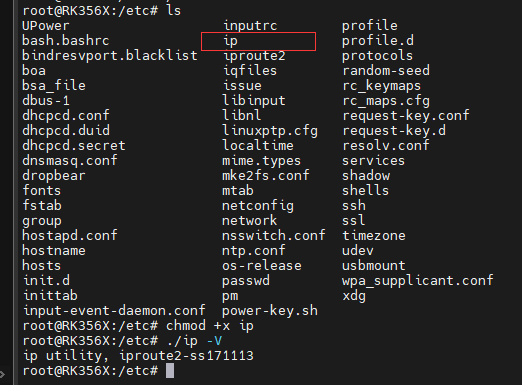
將目標機 原ip可執行文件 替換為/etc/ip 請謹慎操作,註意檢查命令是否正確 /etc/ip是上面編譯iproute工具生成的可執行文件
目標機上
cd /etc進入目標機的etc文件夾cp ip /sbin/ip -f
替換完畢後在進入目標機根目錄測試ip命令的可用性

此狀態即為可用狀態
6.配置並啟動can設備
使用命令查看can匯流排驅動是否載入,在連接好硬體的情況下,使用
ifconfig -a命令查看設備狀態
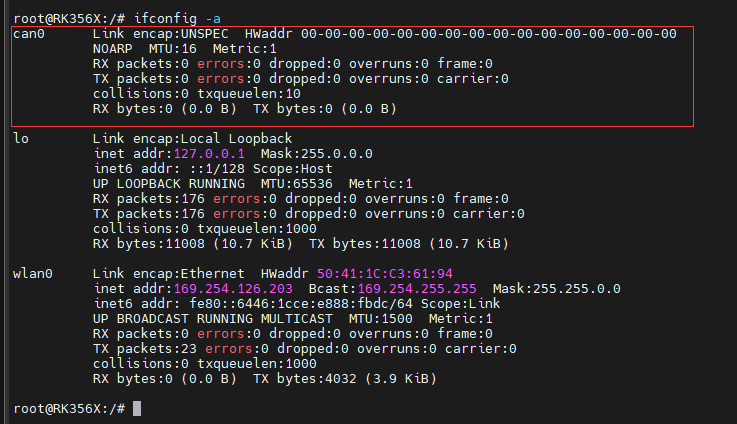
使用ifconfig可以查看成功啟動的設備
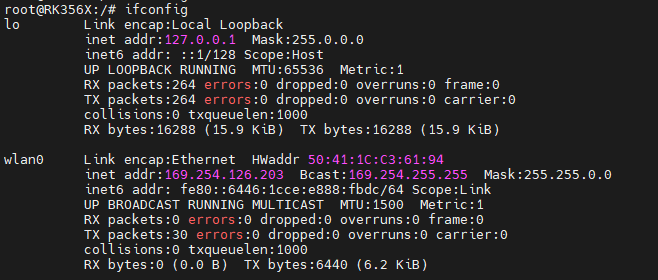
可以看出can0已經成功載入但是並未啟動,此時需配置can匯流排的波特率,使用命令
ip link set can0 type can bitrate 250000 can0即為ifconfig -a命令後出現的can0,250000為波特率,實際速度為250K
此外還有loop模式,啟動命令為ip link set can0 type can bitrate 250000 loopback on後面和正常模式一樣
配置完波特率,啟動can0,使用命令
ifconfig can0 up啟動can0

此時再使用ifconfig可以看到 can0已經啟動
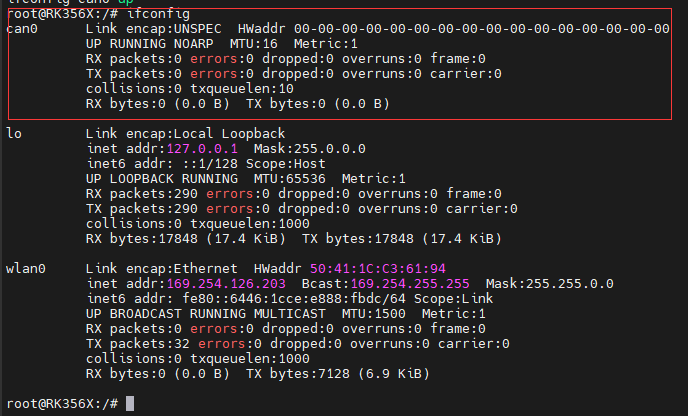
7.測試CAN收發
僅CAN測試,rk官方對CANFD支持不完善
前面編譯的canutils中有candump和cansend兩個工具,cansend可以發送數據,candum可以接收數據
連接好CAN測試工具,在目標板上輸入命令進行接收測試
candump can0 & 可以在串口控制臺中查看收到的數據(adb shell並未測試)
CAN測試工具軟體發送

目標板接收數據為

其中can0 為目標板上mcp2515設備名, 000 為發送方的地址,對應上面圖幀ID [8]為長度 ,01234567為接收的數據
連接好CAN測試工具,在目標板上輸入命令進行發送測試
啟動cansend工具,發送幀id為18E9F4C9,內容為 12 23 34 45 56 67 78 89,長度為8的數據

can0 為MCP2515,18e9f4c9是幀ID, #號後面是數據,數據用'.'作為間隔
CAN測試工具接收為




